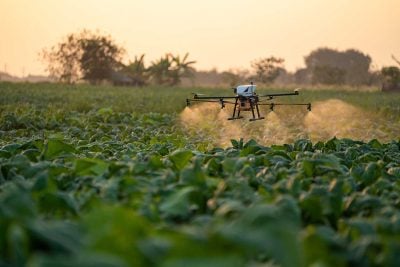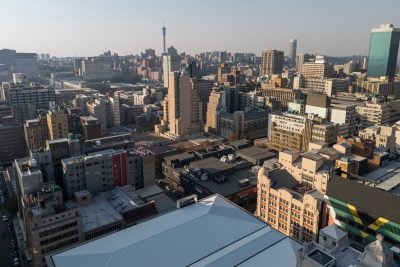Sanne Steemers is the president of Rest of Africa at AFEX, a Lagos-based commodities exchange platform that operates in three markets across the continent: Nigeria, Kenya, and Uganda. Steemers is responsible for infrastructure, markets, and providing capital to smallholder farmers while working on the company’s expansion into 10 markets over the next few years.
Prior to joining AFEX, Steemers worked in several roles as a manager, independent advisor, and entrepreneur in agriculture-focused companies and institutions. During those years, she helped facilitate $320m of investments in agribusiness, reaching 1.3m farmers, according to her own assessment.
After joining AFEX earlier this year, Steemers has now raised her target to $1bn and 10m people. In this interview, she explains her ambitions, AFEX’s expansion into new markets, and the role of commodities exchanges in fighting Africa’s trade deficit in agricultural products.
African Business: What do you identify as the main challenge in your journey to facilitating $1bn in investments into agribusiness?
Sanne Steemers: I think that both in trade and in investments there exist large gaps in the size of the different actors. You have farmers needing small amounts, maybe 100 or $200, to buy the seeds and inputs they need for a season. And then you have people sitting on $1m or $10m who can’t be dealing with hundreds of thousands of farmers at a time. The difference in size is one of the major challenges in bringing investors and smallholders together.
Regarding trade, a similar dynamic exists. In Africa, most farmers operate on small plots of land, typically 1 or 2 hectares, and produce a few bags of grain. But large buyers require truckloads of grain daily. Transforming the small quantities produced by individual farmers into large quantities demanded by processors is another significant hurdle. Addressing these issues is crucial to achieving my goals.
Read more about African agriculture
- Agrifinance grows in importance as farmers seek scarce capital
- Collapse of Black Sea grain deal threatens food crisis for Africa
- Africa’s lack of food processing capacity is a missed economic opportunity
- Can AI address Africa’s agricultural trade deficit?
What are the main trends you are observing in agriculture this year?
One emerging trend gaining traction and significance is regional trade. Recent events, such as Covid, the Black Sea blockade, and trade imbalances impacting shipping costs, have highlighted the risks associated with relying heavily on international trade, especially for critical commodities like food. As a result, integrating regional markets to reduce dependency on the global market and enhance trade balance is becoming increasingly important.
Another noticeable trend is the growing interest from investors, both local and international, in generating positive impact through their investments. In the past, agriculture, particularly smallholder agriculture in Africa, was often overlooked. But in recent years investors have become more conscious of the need for impactful investments. This shift in investor mindset has led to increased investments in agriculture, which in turn supports improved productivity, local production, market access, and infrastructure.
You’ve mentioned the Black Sea blockade. Food prices are set to spike again on the continent after Russia’s withdrawal from the export deal. This comes after a year of tremendous inflation in many African countries. How is the agriculture futures market reacting to these challenges?
The prices of food have been very high globally. And I think a lot of African countries are hit even harder because their currencies aren’t as strong as some international currencies. What we see is that food prices are definitely higher than they’ve been in previous years and there’s a strong push for substituting imports with local supply because that at least takes the currency dynamic out of the equation.
We have a very strong focus on our commodities exchange, which provides price transparency. In the past, middlemen used to buy commodities as cheap as they could and sell them as expensive as they could to make a high margin and put that in their own pocket, without necessarily adding much value.
What we quite strongly believe in is that in order for countries to be food secure, we need to get price transparency. Farmers should know what their product is worth and buyers what’s available in the market. This would eventually improve the prices for farmers as well as for the buyers in the long term.
On top of that, building infrastructure is critical. Agriculture generally depends on seasonality. Rain determines when the harvest is happening and prices are generally low at that point of time. If you offer farmers an opportunity to store their product for three months, they tend to get a 30% better price for that same product, and their income spreads out throughout the year. That storage also makes sure that food is available for the population throughout the year and not just at harvest time. Addressing these dynamics helps respond to higher food prices, but more efforts are needed in this direction.
Africa suffers from a major trade imbalance in agriculture, mainly driven by large imports of cereals. How can this trend be reversed?
Indeed, trade imbalances in commodities such as rice, wheat, sorghum, and maize are prevalent. I believe reversing this trend involves three things: addressing productivity, reducing waste, and connecting small farmers to larger buyers.
Enhancing productivity is crucial, as many smallholder farmers currently achieve lower yields due to factors like insufficient knowledge, inadequate tools, and limited access to inputs. AFEX addresses this productivity gap, for example through providing inputs on credit, and that input can then be repaid at harvest time, either in cash or in crop, as the farmer prefers. And what we observe is that, on average, it triples the yields that the farmer would otherwise get.
Reducing waste in the value chain is equally essential. Farmers often hold back some of their harvest for personal use or urgent financial needs, resulting in storage under suboptimal conditions and subsequent loss of quality and quantity. Reducing waste along the value chain would help capture additional value for them.
Lastly, aggregating small volumes from farmers can facilitate transactions with larger buyers. For processors to function efficiently, they need consistent supplies in large quantities, which is challenging with a fragmented smallholder system. The idea of a commodities exchange is to aggregate these small volumes to ensure a steady and reliable supply for larger buyers.
To promote intra-African trade in agriculture, what measures need to be taken to re-route current trade routes?
Cross-border trade within Africa hasn’t always necessarily been very easy. There’s a lot of paperwork involved. I know progress is being made as the African Continental Free Trade Agreement is slowly being implemented, and streamlining those cross-border processes is going to help.
I think Africa would also strongly benefit from having unity in quality requirements. For example, in our operations in Kenya, we only do domestic trade, but we’ve seen that Kenya in recent weeks has rejected imports from several other neighbouring countries.
Part of it is also to recognise the opportunity in Africa. I think historically a lot of people haven’t really tried to fix this issue. I do believe that there’s a major opportunity to substitute imports by sourcing locally and supporting the farmers in the country of operation. And, on top of that, I think there’s a lot that can be done with regional trade.
Also, if you look at complementary harvest seasons, for example, when one country is harvesting, there might be higher demand in a different country. Those are the things that we’re trying to solve with our commodities exchange platform. But it’s also a process that requires commitment and willingness.
As a commodities exchange, what are your expectations from financial regulators in the countries you operate in?
What we see is that various countries have a very different view on regulation. If you look at Côte d’Ivoire, for example, historically, there’s been much more regulation in place for the agricultural sector. If you look at Nigeria, there’s hardly been any in the past. So it’s not easy to answer that question on a generic level.
But in most African countries that we work in, a lot of the governments are pro-business in the sense that they allow the private sector to conclude transactions. They’re moving away from the government as a “value chain actor”, and closer to the government as an enabler.
In Kenya, we were the first company to be certified by the Warehouse Receipt System Council, which means that any farmer that produces to our warehouse gets issued a warehouse receipt which is then recognised by a bank. They can then get finance against that receipt, which gives them the flexibility and empowers them to decide how they want to sell their commodity.
We also see that some governments are setting up or powering commodities exchanges. In some of the countries, those are private exchanges that are regulated by the government, such as what we do in Nigeria, but we also have several relations with governments in a number of countries where they want to set up a public commodities exchange. Overall, those initiatives are more towards enabling trade rather than controlling it, which, I think, is a healthy development.
Want to continue reading? Subscribe today.
You've read all your free articles for this month! Subscribe now to enjoy full access to our content.
Digital Monthly
£8.00 / month
Receive full unlimited access to our articles, opinions, podcasts and more.
Digital Yearly
£70.00 / year
Our best value offer - save £26 and gain access to all of our digital content for an entire year!

 Sign in with Google
Sign in with Google 



